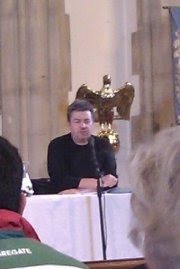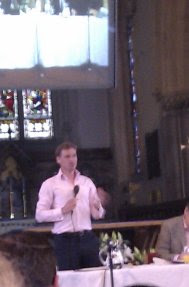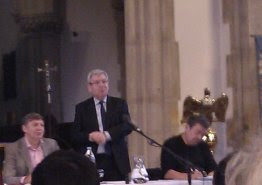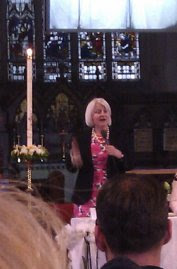AV hustings in West Hampstead provoke fiery debate
On Wednesday this week, Father Andrew Cain at St Mary’s church hosted Camden’s only hustings debate on the upcoming referendum on the Alternative Vote (AV) system.
In favour of AV were local councillor Andrew Marshall – going against his Conservative party line – and Times journalist David Aaronovitch. On the No side sat former Hampstead & Kilburn Conservative PPC Chris Philp and Labour MP for Mitcham and Morden Siobhain McDonagh.
Around 100 people filled the pews at St Mary’s and it was gratifying to see a healthy number of younger people participating. The Ham & High’s editor Geoff Martin presided over proceedings.
David Aaronovitch kicked the debate off explaining that he initially hadn’t felt that strongly about what he described as “a mild reform” until he’d seen the arguments rolled out by the No campaign. He reeled off some figures that ostensibly made the point that while First Past The Post (FTPT) had worked well when there were only two main parties and turnouts were high, it was less suited to today’s lower turnout/multi-party world.
 |
| Aaronovitch: “mild reform” |
Chris stood up to deliver his speech – still unable to shed that slight hectoring tone that some found offputting during his election campaign. Apart from attempting a very dodgy Yorkshire accent at one stage – the less said about that the better – he set out to suggest that people simply weren’t interested in voting reform and that the whole issue had come about purely as a condition of the coalition agreement. He trotted out the argument that AV would make hung parliaments more likely and argued that this would remove the public’s right to select the government and hand it to the Lib Dems. He made lots of references to the BNP, although didn’t articulate clearly [at least to me] how AV would benefit them – he seemed more concerned to say that he didn’t have any interest in receiving the second vote of a BNP voter and didn’t believe it was right that such voters had more influence over the result.
 |
| Philp: “I don’t want the second vote of a BNP voter” |
Andrew opened his Yes speech suggesting that in an age of enormous amounts of data, it was ironic that we asked so little about people’s opinions every 4–5 years. “FPTP assumes people are very indifferent to the merits of other candidates.” Although he agreed that people on the doorstep hadn’t talked actively about voting reform, plenty had asked him how they should vote tactically. He also argued that if there were more hung parliaments, that was up to the electorate and if parties wanted to avoid that then they had to do more to get the necessary votes. He also reminded the audience that AV is already used in other elections in the UK – for example in Welsh and Scottish elections and – as has been mentioned a lot – in the leadership elections for both the main parties. Countering Chris’s arguments about FPTP being used in the US, he quipped that Al Gore knew all too well that FPTP didn’t always work.
 |
| Marshall: Parties must work harder to get votes |
Siobhain McDonagh arrived late and thus hadn’t heard much of what either Yes campaigner had said. She began with a dubious joke about coming from south London before launching into a clearly well-rehearsed speech. She argued that FPTP was simple and traditional with a story about seeing people in her constituency who’d fled persecution “and in their eyes I see a respect for our system.” She also argued that AV would mean giving up the right to influence parties’ manifesto for the “direction of travel” they would follow. I didn’t really follow the logic of this to be honest. She then launched into a savage attack on the Lib Dems over, for example, tuition fees, saying that they “deserve a kicking.”. This did not go down well with the audience who started heckling loudly with cries of “stick to the topic”.
 |
| McDonagh: “Lib Dems deserve a kicking” |
The floor was now open to questions, of which there were many. There was a lot of arguing between Chris and David over the interpretation of statistics, for example on the number of hung parliaments. Lib Dem PPC Ed Fordham popped up from behind a flower display to ask about the use of AV in other UK elections and allowed Chris to get in a neatly worked jibe about Ed Miliband being the “least offensive” candidate for the Labour leadership.
David claimed that saying that people voting for smaller parties had an “extra vote” was ludicrous, using the French presidential election as his example (the French system is very similar to AV but there is a time gap between making your first choice and second choice as the lowest scoring candidates are knocked out). He undermined Siobhain’s point that FPTP was a British tradition by pointing out the use of AV in Wales and Scotland. One might also argue that plenty of other voting “traditions” have been altered as times change.
The atmosphere in the church was getting more and more fractious, especially as one guy started shouting almost everytime any of the panel spoke. It got to the stage where David was treating him as a stand-up would an annoying heckler and frankly he should have been thrown out.
An unsuccessful Labour PPC from Yorkshire asked how the FPTP campaign would answer voters who thought there was “no point” turning out in very safe seats. He argued that voter apathy was in many cases “realistic apathy” rather than a lack of interest in politics. Chris pointed out that the very safe seats were won by 50% majorities anyway and therefore AV wouldn’t make a difference.
Inevitably someone in the audience opened with “I promise this will be a short question,” before launching into a long statement. Then David took real issue with what he described as a “pious” attitude from Chris who had been saying that all he wanted was for people to vote for the person they wanted to win. Echoing the thoughts, I suspect, of almost everyone in this constituency who lived through the vociferous arguments of all the three parties that only two of them could possibly win. The result: the closest three-way vote in the country.
There was much talk of the fact that Australia uses the AV system – with people reading both positive and negative outcomes from the country’s lengthy experience with it. An erudite Australian stood up and gave his verdict on it – which was wholeheartedly positive and ended up getting the biggest cheer of the night.
The whole audience was getting more lively – my favourite heckle coming as one man stood up and gave a long speech saying he feared AV would put us on the “slippery slope to PR”. “Oh dear,” said an older woman a few rows back – her voice dripping with amused sarcasm. Andrew responded that given the slow pace of electoral reform it must be a very shallow slope. Siobhain, who had let Chris handle most of the answers to the audience, finally chipped in with a comment about the very low turnout she expected for this referendum and Chris finally scored an emphatic point against David who had accused the No campaign of “whipping up apathy”, citing the three months he had dedicated to this.
One audience member challenged Siobhain’s point about simplicity, suggesting that it was odd to champion simplicity for something as important as electing the government, and wondered whether AV would ignite young people’s interest in politics. Chris argued that more dynamic politicians would do that.
The session finally wrapped up – there was no attempt to take a vote and no-one was prepared to admit that the hustings had changed their mind, but it was good to see a healthy turnout and a distinct lack of apathy among these voters.
It will be interesting to see how the Hampstead & Kilburn vote on May 5th compares to the London and national vote given the constituency’s unusual position as a genuinely tight 3-way, where AV might have ended up in any of the three main candidates taking the seat.

Comments
AV hustings in West Hampstead provoke fiery debate — No Comments
HTML tags allowed in your comment: <a href="" title=""> <abbr title=""> <acronym title=""> <b> <blockquote cite=""> <cite> <code> <del datetime=""> <em> <i> <q cite=""> <s> <strike> <strong>